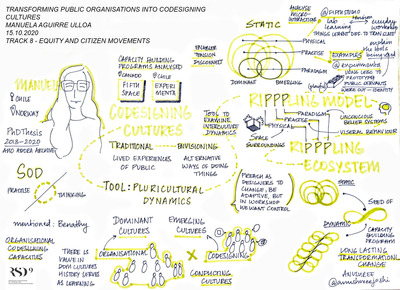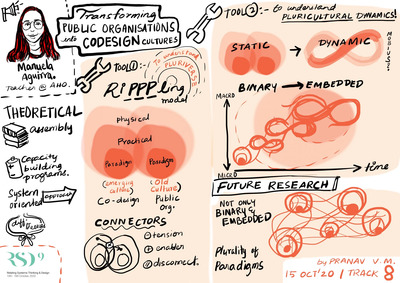Transforming Public Organizations into Co-designing Cultures
Aguirre Ulloa, Manuela (2020) Transforming Public Organizations into Co-designing Cultures. In: Proceedings of Relating Systems Thinking and Design (RSD9) 2020 Symposium., 9-17 Oct 2020, Ahmedabad, India.
Preview |
Text
AguirreUlloa_Transforming_Slides_2020.pdf Available under License Creative Commons Attribution Non-commercial No Derivatives. Download (84MB) | Preview |
![AguirreUlloa_TransformingGig1_2020.png [thumbnail of AguirreUlloa_TransformingGig1_2020.png]](https://openresearch.ocadu.ca/3704/1.hassmallThumbnailVersion/AguirreUlloa_TransformingGig1_2020.png)  Preview |
Image
AguirreUlloa_TransformingGig1_2020.png Available under License Creative Commons Attribution Non-commercial No Derivatives. Download (3MB) | Preview |
![AguirreUlloa_TransformingGig2_2020.png [thumbnail of AguirreUlloa_TransformingGig2_2020.png]](https://openresearch.ocadu.ca/3704/2.hassmallThumbnailVersion/AguirreUlloa_TransformingGig2_2020.png)  Preview |
Image
AguirreUlloa_TransformingGig2_2020.png Available under License Creative Commons Attribution Non-commercial No Derivatives. Download (3MB) | Preview |
Abstract
When designers try to create lasting change in the public sector, their aim is not only to co-design meaningful new or improved services but also to embed the capacity – rather than dependency – of co-design into the organization. Current research suggests that this embedded co-design capacity allows for ongoing transformation. Organizational change can be achieved in various ways, one of which is by facilitating experiential capacity-building programs that immerse public employees in codesigning methods and approaches over the course of several months. In this context, designers often experience that the existing organizational culture strongly constrains the adoption and application of new ways of working. However, many designers are not trained to address this cultural phenomenon.
Through a systems-oriented design (SOD) approach, two cases of capacity building programs from different countries were analyzed, Fifth Space in Canada and Experimenta in Chile. An integrated research approach combining methods, such as research by design, gigamapping, interviews, and literature mapping was used to get new insights into the complex, contemporary design practice of nurturing and spreading organizational co-design capacities. The analysis of both programs drew my attention to the liminal space between the pre-existing culture in the organization and the emerging culture related to the introduction of new methods and ways of working. While it seemed like these conflicting cultures prohibited lasting innovation, there was also a lack of models and reflective tools to examine these intercultural dynamics.
This thesis presents analytical and conceptual models that help to make interactions between the emerging and existing organizational culture more explicit and actionable. First, the Ripppling model provides three analytical dimensions – paradigm, practices, and the physical dimension – to analyze the interactions between the emerging and dominant organizational cultures. This analysis can help to position the emerging culture in a constructive way without alienating the dominant culture, and to enable the co-existence of both for long-lasting transformational change. The Ripppling ecosystem model builds on the micro-interactions analyzed with the Ripppling model and proposes a system of embedded layers for large-scale cultural change processes that can have effects beyond the organization that participates in the capacity-building program.
Taken together, the results of this thesis help to explain the difficulties public organizations face when introducing new capacities, such as co-design. My work suggests that these new capacities function as carriers or vehicles of cultural meaning that will inherently generate productive or unproductive tensions with the pre-existing culture. Therefore, one has to carefully recognize and address the underlying interactions across cultures to build organizational transformation strategically and to leverage the full potential of co-designing approaches. This work gives new insights into how to create continuous change in the public sector and has implications for future design practice, research, and education.
| Item Type: | Conference/Workshop Item (Paper) |
|---|---|
| Divisions: | Faculty of Design |
| Date Deposited: | 10 May 2022 15:20 |
| Last Modified: | 10 May 2022 15:30 |
| URI: | https://openresearch.ocadu.ca/id/eprint/3704 |
Actions (login required)
 |
Edit View |

 Lists
Lists Lists
Lists